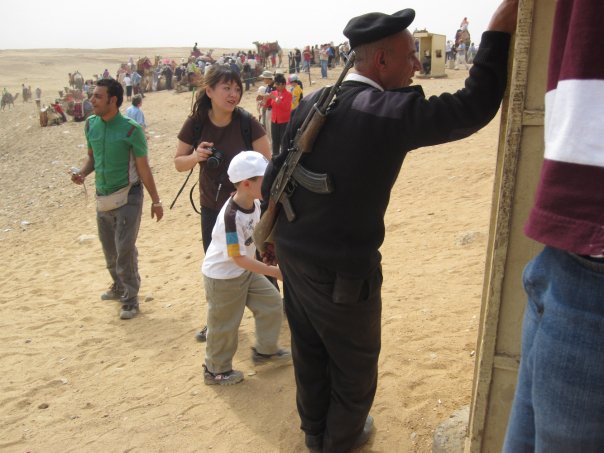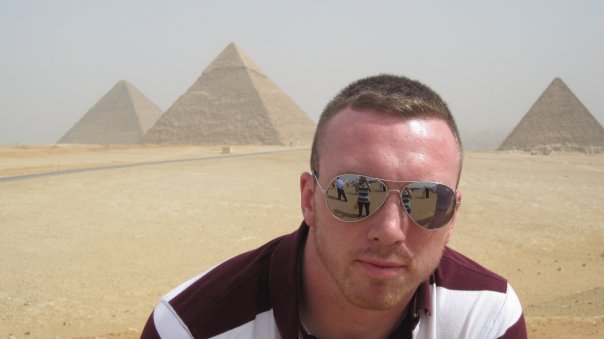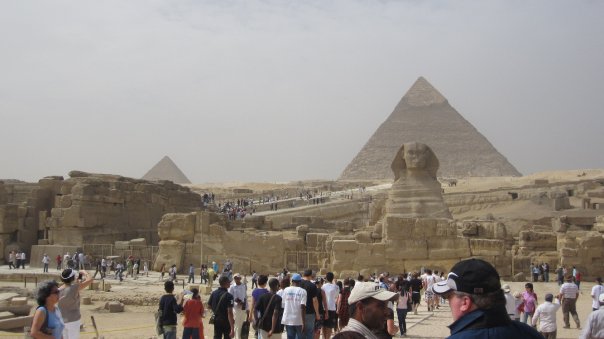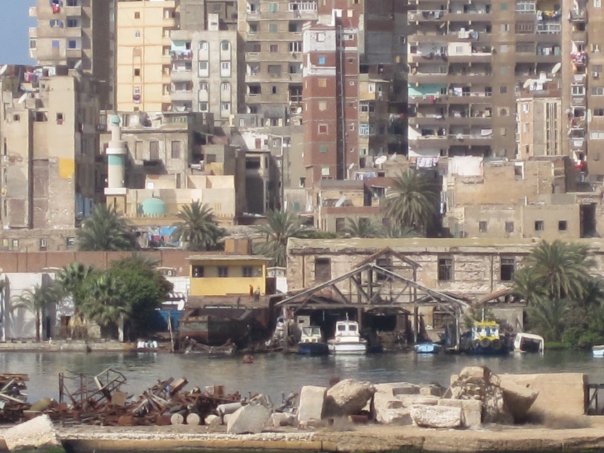The Giza Plateau is not located in some isolated stretch of desert, but is rather a block away from what looked like the worst parts of Chicago. We disembarked our bus in a large parking lot packed with other cars and buses, and as our tour guide herded us toward the looming structures in the distance, the group of armed men meandered through the crowd with the sort of confidence you’d expect from a dozen guys wearing matching tweed jackets, carrying assault rifles. I grabbed the tour guide’s arm and quietly asked who the armed men were. He shrugged and simply replied, “Tourism police.”

Although I was relieved to learn that the group of loosely uniformed men were law enforcement, the way they carried themselves around the crowd still left me a little uncertain. When we approached the pyramids themselves, an older British woman in my group tried to take a selfie that could capture the scale of the pyramid behind her, but failed, and one of the “tourism police” officers approached her. I watched as he offered to take her photograph and she excitedly offered her camera to him. He stepped back and snapped a few pictures, even asking if she’d prefer landscape or portrait, before promptly demanding 50 Euros for the camera’s safe return.
Soon thereafter, I watched a similar altercation unfold as a man offered a heavy-set American woman the opportunity to have her photo taken on a camel in front of the Great Pyramid of Giza. At his command, the camel promptly kneeled, allowing her to climb onto its back, then stood again. He took her picture, then demanded a sum of money I couldn’t quite make out before he’d give the camel the order to kneel for her to disembark. While a guy like me may not hesitate to hop off a camel’s back, something tells me the 60-year-old woman with a spare tire and a cane in hand would likely have trouble sticking the landing from that height. Like the other women, she paid the armed man what he asked.
The pyramids were amazing and picturesque, though the dense crowd surrounding them was something more akin to being in the mosh pit at a rock concert. My discomfort with crowds, inability to stop assessing threats surrounding me, and general disgust with the innumerable peddlers and salesmen that wouldn’t take no for an answer eventually led me to the Great Sphinx…and the KFC/Pizza Hut combination restaurant directly across the parking lot from it.
Having already taken my pictures, I sat down on a curb facing the pyramids, the Sphinx, and the immense mass of humanity before me. I’d seen this place on television so many times, I thought I’d know exactly what being there in person would be like. But the truth was, I wasn’t in awe of the amazing feat of ancient engineering before me, nor was I impressed by the beauty of the Sahara. I was just disgusted by the people. Tourists throwing their trash on the ground, locals extorting Euros from the elderly, guides ushering pale-faced herds out of one bus and into another.
People are the same everywhere you go, and sometimes, that means they’re awful.
The bus ride back was a sad one for me. At the time, I hadn’t traveled as much as I have now, and I’d hoped seeing the pyramids would be an epic moment in my life. It wasn’t the Egypt I’d come to see, and I was disappointed.
Before my time in Cairo was over, however, I made one more stop. Early the next morning, I visited a museum and found that they offered a lunch made of multiple small courses to give you a sense of the different kinds of food commonly prepared in that part of the country. We took our seats at long, cafeteria-style tables in a beautiful hall. I knew some of the people at my table, but most were strangers, so I decided to spark up some conversation. I quickly came to learn that one of the people I was sitting with was a local who was at the luncheon as a part of her training to become a tour guide. She had limited experience with Americans, but also spoke incredible English.
“Don’t judge Egypt based on our pyramids and I won’t judge America based on your fanny packs,” she explained when I told her my story from the day before. I haven’t kept in touch with her, but I have no doubt that she made an incredible tour guide.
Egypt is a beautiful country, and the pyramids are an incredible piece of history worthy of our awe and admiration. The Egyptian people, like Americans, are smart, caring, and funny—some of the tour guides are even witty enough to put a smart ass like me in my place—but there is a dark side.
Keep your wits about you, go nowhere alone, and never climb onto a camel unless you’re sure you can get back off of it.
And leave your fanny pack at home.












COMMENTS